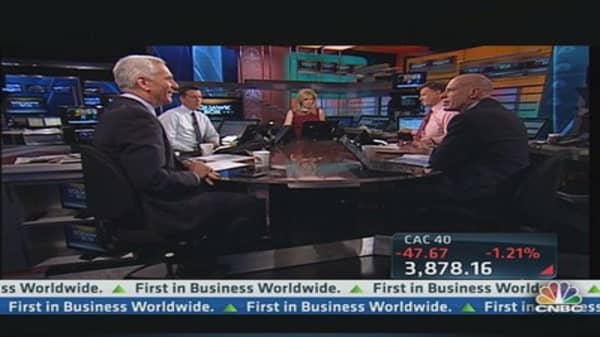Apple and other American multinationals that keep money overseas to avoid paying higher U.S. corporate tax rates are not doing anything wrong, pundits on both sides of the aisle said Wednesday on CNBC. But they clashed on how to change the tax code to encourage companies to bring those funds home.
"I don't blame Apple. The tax code incentivizes tax avoidance," Jared Bernstein, former chief economist to Vice President Joe Biden, said in a "Squawk Box" interview.
Appearing with Bernstein, Ed Lazear, former chairman of the Council of Economic Advisers under President George W. Bush, said: "If you're seeing someone hit too many home runs, you don't tell a guy to bunt. You move the fences out. You got the wrong tax code."
"What you need to do is not vilify Apple for living within the tax code," Lazear continued, "and doing what they should be doing in respect to their shareholders."
That's where Lazear and Bernstein found common ground. But it didn't last.
"Are there much more efficient ways to raise taxes?" Lazear asked, arguing that "almost all economists think we should move in a direction of a progressive consumption tax. That's the way we should go."
"Going to a VAT or a consumption tax is a really big ask right now," Bernstein countered. "Something much simpler is to have a minimum tax on foreign earnings."
"Go ahead and play your double-dutch Irish sandwiches, Apple and Google. Do all your Cayman Islands stuff," he added. "But a minimum [of taxes] would come back to our coffers."
Lazear said a minimum tax "is essentially a patchwork on what is already a distorted system. I'd rather see a much more radical reform of the system."
Apple CEO Tim Cook called for an overhaul of the U.S. corporate tax code at a Senate hearing last month over claims that the high-tech giant has kept billions of dollars in profits in Irish subsidiaries and paid little or no taxes to any government.
(Read More: Tim Cook: We Pay 'Every Single Dollar' in Taxes Owed)
Another idea that's been floated to encourage global companies like Apple to bring money to the U.S. is a repatriation holiday.
"That's a bad idea," Bernstein argued. "That worked terribly in 2004" when Congress passed a temporary measure that allowed companies to bring money back from overseas at 5.25 percent tax rate instead of the usual 35 percent.
Lazear disagreed with Bernstein's characterization, but acknowledged that the turnaround in the investment pattern in 2003 was more attributable to the change in capital gains and dividends taxation than the corporate tax holiday.
—By CNBC's Matthew J. Belvedere. Follow him on Twitter @Matt_SquawkCNBC.




